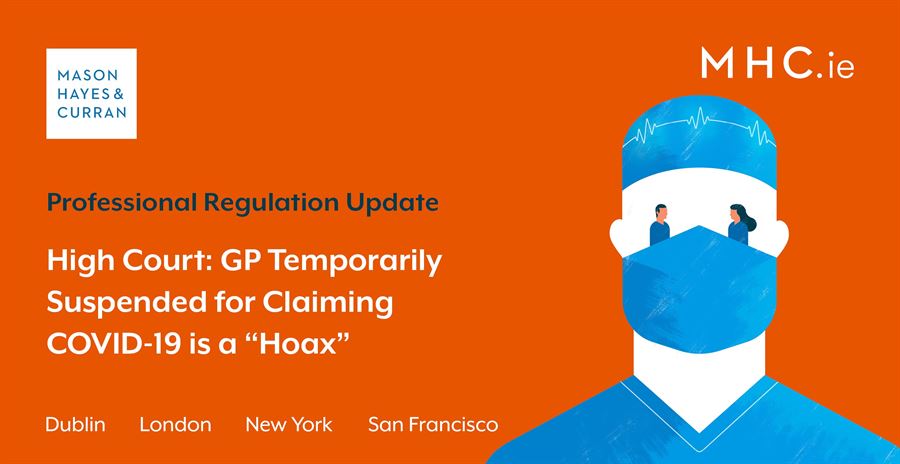High Court: GP Temporarily Suspended for Claiming COVID-19 is a “Hoax”

The High Court has temporarily suspended a doctor for his behaviour in relation to the COVID-19 pandemic. The case arose after a patient complained to the Medical Council in September 2020 that the doctor refused to refer him for COVID-19 testing. It was also alleged that a leaflet entitled, “No pandemic killing us” was found in the doctor’s waiting room. The doctor also claimed that a patient’s COVID-19 symptoms arose as a result of wearing a mask.
Following the complaint, the Medical Council wrote to Dr Gerard Waters, the doctor concerned. Dr Waters responded claiming that COVID-19 is no worse than the flu. He said that the psychological impact of lockdowns caused more harm than the virus itself . He also indicated that neither he nor his staff wore masks or complied with other public health guidelines in his clinic. Dr Waters stated that he considered himself to be a “conscientious objector” and did not intend to administer vaccines to his patients. At the time of the judgment, he had not referred any patients for COVID-19 testing.
Necessary to protect the public
The Medical Council can seek a temporary suspension of a medical practitioner while disciplinary proceedings are being instigated against them. It can also be done pending a further court order under Section 60 of the Medical Practitioners Act 2007. The court will only grant a suspension order if it is necessary in order to protect the public. This is because of the very significant adverse consequences suspension can have on the medical practitioner both in terms of their constitutional right to earn a livelihood and their right against reputational damage.
Ms Justice Mary Irvine, President of the High Court, applied the test laid out in O’Ceallaigh v An Bord Altranais to determine whether the public interest weighed in favour of suspension, having regard to:
- The seriousness of the conduct complained of
- The strength of the case against the practitioner; and
- Whether the likely outcome, in terms of sanction, in the event of the misconduct being established would be a strike off either on a definite or permanent basis.
Ms Justice Irvine ultimately found that Dr Waters’ behaviour exposed his patients to a very real risk of infection when attending his clinic. If a patient was positive for COVID-19, they would be placed at risk of remaining undiagnosed and having their treatment delayed. They might also not be advised to self-isolate and could go on to spread the virus in the community. The suspension was therefore not disproportionate and the order was granted on 2 March 2021.
Conscientious objection
Dr Waters sought to rely on his right as a conscientious objector, referring to paragraph 49 of the Guide to Professional Conduct and Ethics for Registered Medical Practitioners. This says that a doctor may refuse to provide treatment or care if it conflicts with their ethical or moral values. President Irvine pointed out that Dr Waters had not denied that COVID-19 can kill, nor that it is contagious. She found that notwithstanding his conscientious objection right, he was not permitted to place his patients at risk.
Public vs private
Suspension applications are heard privately unless there is a reason not to do so. In this case, the Medical Council went back to court to request publication. This was done after a poster in Dr Waters’ clinic appeared stating that “Dr Waters has been suspended from the medical register because he refused to give the Covid-19 vaccine and objected to the Covid-19 lockdowns.” Ms Justice Irvine granted the Council’s requests to publish the judgment. She also approved the request to have the banner removed as it misrepresented the basis for the order.
The Medical Council will now begin its investigation into Dr Waters’ case before the Fitness to Practise Committee. The case shows the legal methods of recourse in urgent matters where it is imperative that public health guidelines and principles of transparency are upheld in the interests of public safety.
For more information, contact a member of our Professional Regulatory & Disciplinary team.
The content of this article is provided for information purposes only and does not constitute legal or other advice.
Share this:

Catherine Allen
Partner, Head of Public, Regulatory and Investigations
+353 86 382 1009 callen@mhc.ie

